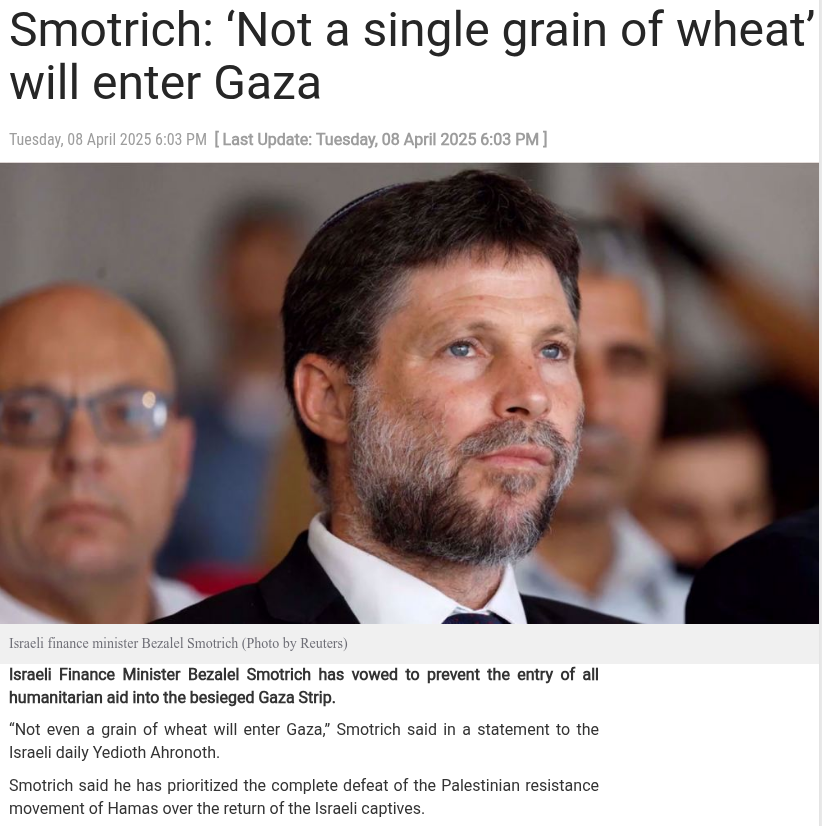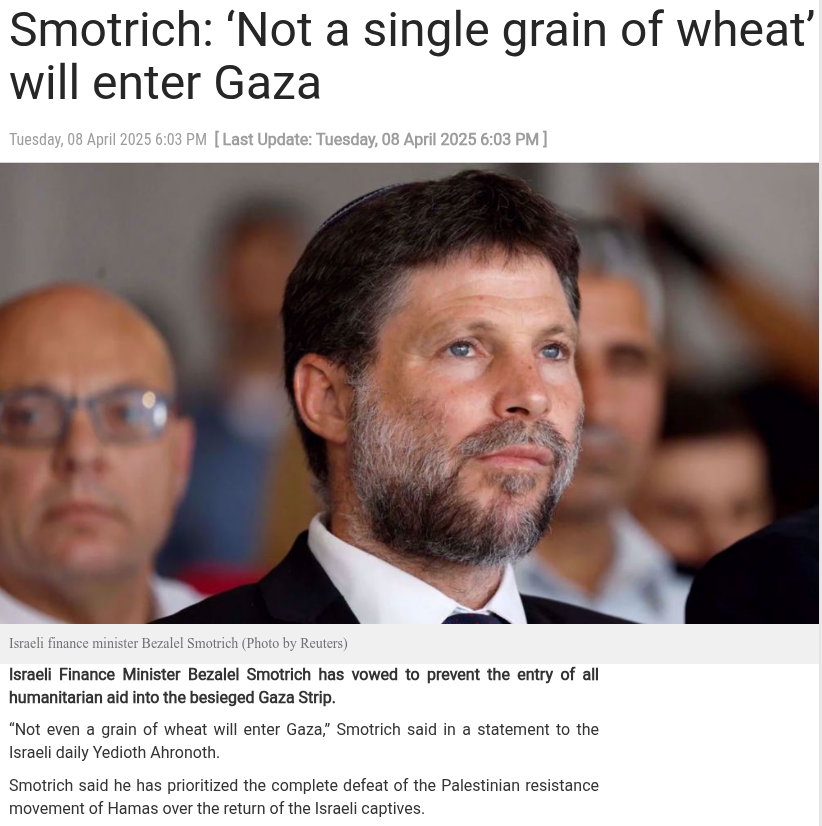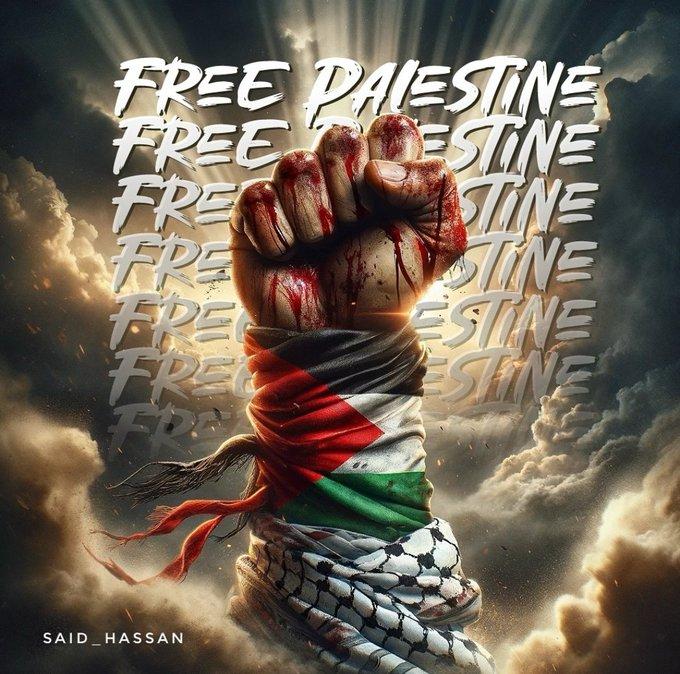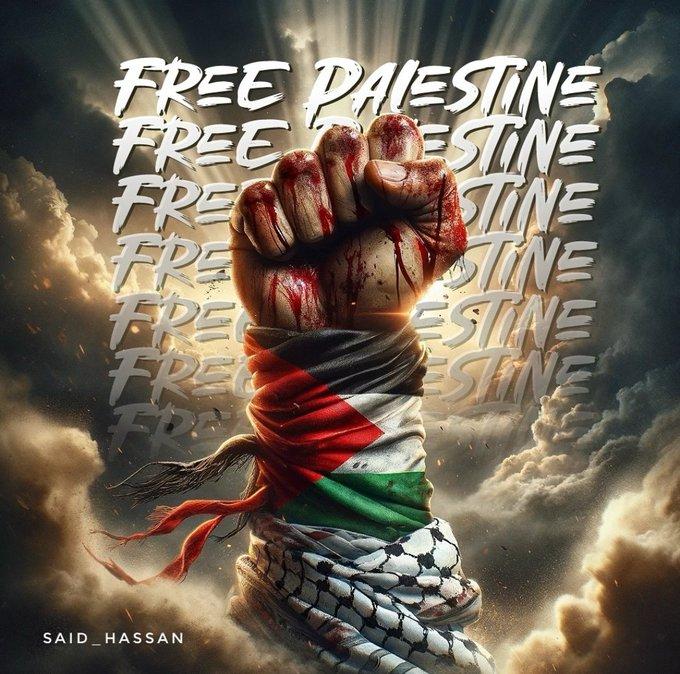"There is a time when the operation of the machine becomes so odious, makes you so sick at heart, that you can't take part... you've got to put your bodies upon the gears and upon the wheels, upon the levers, upon all the apparatus, and you've got to make it stop." — Mario Savio, Sproul Hall Sit-in Address, December 2, 1964, University of California, Berkeley
There is a time when the operation of the machine becomes so odious, makes you so sick at heart, that you can't take part... you've got to put your bodies upon the gears and upon the wheels, upon the levers, upon all the apparatus, and you've got to make it stop. -- Linkin Park (R.I.P. Chester Bennington)
Israel’s Siege on Gaza: A War Crime Starving Millions—Act Now!
For over six weeks, since early March 2025, Israel has imposed a total siege on Gaza, blocking all humanitarian aid, including food, medicine, and fuel. Israeli Finance Minister Bezalel Smotrich declared on April 8, 2025, that “not even a grain of wheat will enter Gaza,” prioritizing the “defeat of Hamas” over the lives of 2 million Palestinians. The result? Thousands of aid trucks—carrying tens of thousands of tons of food—are stuck at Rafah and Kerem Shalom, rotting under the sun, while inside Gaza, all bakeries have shut down due to a lack of flour. Children are dying of starvation—WHO reports at least 30 deaths by early April—families are grinding animal feed to survive, and black markets sell smuggled aid at prices like $60 for a sack of flour that should be free.
This is not just a humanitarian crisis; it’s a deliberate violation of international law. The Fourth Geneva Convention (Article 55) mandates that occupying powers ensure food and medical supplies for civilians. Starvation as a method of warfare is explicitly prohibited under Protocol I (Article 54), and the Rome Statute of the International Criminal Court classifies it as a war crime. UN experts, Human Rights Watch, and Amnesty International have already labeled Israel’s actions as potential crimes against humanity, even genocidal acts. The ICC issued warrants in 2024 against Israeli leaders like Yoav Gallant for similar starvation tactics. Yet, Smotrich’s words show this policy is intentional, a “war of starvation” designed to break Gaza’s people.
I have friends in Gaza begging for help, but here’s the brutal truth: even if I sent a billion dollars, it wouldn’t change Israel’s policies or allow a single grain of wheat into the Strip. The siege creates scarcity, fueling black markets where collaborators profit off desperation, while the blockade ensures nothing gets through. Yahya Sinwar, Hamas’ leader, hadn’t eaten for three days before his death in October 2024—Israel’s own autopsy confirmed it. If even he was starving, what chance do ordinary Gazans have? This isn’t about Hamas hoarding; it’s about Israel’s chokehold.
We can’t sit by while Gaza starves. I’m calling on the international community to act:
1. Lobby for airdrops now. With land crossings blocked, airdrops are the only way to get food and medicine directly to Gazans, bypassing the siege and profiteers. Jordan and Egypt have done it before—pressure your governments to join them.
2. Urge the UN General Assembly to use Resolution 377 (“Uniting for Peace”). When the Security Council fails—vetoed by the US—Resolution 377 empowers the UNGA to act, forcing the delivery of humanitarian aid and holding Israel accountable. Write to your UN representatives, demand an emergency session, and push for enforcement of international law.
Gaza’s people are being starved in plain sight. Share this, raise your voice, and act—before it’s too late. #GazaSiege #EndStarvation #UNActNow

حصار إسرائيل على غزة: جريمة حرب تجوّع الملايين - تحرك الآن!
منذ أكثر من ستة أسابيع، منذ بداية مارس 2025، فرضت إسرائيل حصارًا كاملًا على غزة، حيث منعت كل المساعدات الإنسانية، بما في ذلك الطعام والدواء والوقود. أعلن وزير المالية الإسرائيلي بتسلئيل سموتريتش في 8 أبريل 2025 أنه "لن يدخل حبة قمح واحدة إلى غزة"، مفضلاً "هزيمة حماس" على حياة أكثر من مليوني فلسطيني. النتيجة؟ آلاف الشاحنات المحملة بالمساعدات—تحمل عشرات الآلاف من الأطنان من الطعام—عالقة عند معابر رفح وكرم أبو سالم، تتعفن تحت الشمس، بينما في الداخل، أُغلقت جميع المخابز في غزة بسبب نقص الطحين. الأطفال يموتون جوعًا—منظمة الصحة العالمية سجلت وفاة 30 طفلًا على الأقل بحلول أوائل أبريل—والعائلات تلجأ إلى طحن علف الحيوانات أو البحث عن نباتات برية للبقاء على قيد الحياة، بينما تباع المساعدات المهربة في الأسواق السوداء بأسعار مثل 60 دولارًا لكيس طحين يُفترض أن يكون مجانيًا.
هذه ليست مجرد أزمة إنسانية؛ إنها انتهاك متعمد للقانون الدولي. اتفاقية جنيف الرابعة (المادة 55) تلزم القوة القائمة بالاحتلال بضمان توفير الغذاء والإمدادات الطبية للمدنيين. التجويع كوسيلة حرب محظور صراحة بموجب البروتوكول الأول (المادة 54)، وميثاق روما الخاص بالمحكمة الجنائية الدولية يصنفه كجريمة حرب. خبراء الأمم المتحدة ومنظمة هيومن رايتس ووتش ومنظمة العفو الدولية وصفوا أفعال إسرائيل بأنها جرائم ضد الإنسانية، بل وحتى أعمال إبادة جماعية محتملة. أصدرت المحكمة الجنائية الدولية أوامر توقيف في 2024 ضد قادة إسرائيليين مثل يوآف غالانت بسبب أساليب التجويع المماثلة. ومع ذلك، كلمات سموتريتش تظهر أن هذه السياسة متعمدة، "حرب تجويع" تهدف إلى كسر شعب غزة.
لدي أصدقاء في غزة يتوسلون المساعدة، لكن الحقيقة المريرة هي: حتى لو أرسلت مليار دولار، فلن يغير ذلك سياسات إسرائيل أو يسمح بدخول حبة قمح واحدة إلى القطاع. الحصار يخلق ندرة، مما يغذي الأسواق السوداء حيث يستفيد المتعاونون من يأس الناس، بينما يضمن الحصار عدم وصول أي شيء. يحيى السنوار، زعيم حماس، لم يأكل لمدة ثلاثة أيام قبل مقتله في أكتوبر 2024—تأكد ذلك تشريح إسرائيل نفسه. إذا كان حتى هو يتضور جوعًا، فما الفرص التي يملكها الفلسطينيون العاديون؟ هذا ليس عن تخزين حماس للمساعدات؛ إنه عن قبضة إسرائيل.
لا يمكننا أن نجلس مكتوفي الأيدي بينما يتضور شعب غزة جوعًا. أدعو المجتمع الدولي للتحرك:
1. اضغطوا من أجل إسقاط المساعدات جوًا الآن. مع إغلاق المعابر البرية، الإسقاط الجوي هو الطريقة الوحيدة لإيصال الطعام والدواء مباشرة إلى سكان غزة، متجاوزًا الحصار والمستغلين. الأردن ومصر قامتا بذلك من قبل—اضغطوا على حكوماتكم للانضمام إليهما.
2. حثوا الجمعية العامة للأمم المتحدة على استخدام القرار 377 ("التوحد من أجل السلام"). عندما يفشل مجلس الأمن—بسبب الفيتو الأمريكي—يخول القرار 377 للجمعية العامة التحرك، وفرض توصيل المساعدات الإنسانية ومحاسبة إسرائيل. اكتبوا إلى ممثلي بلادكم في الأمم المتحدة، اطلبوا جلسة طارئة، وادفعوا لتطبيق القانون الدولي.
شعب غزة يتضور جوعًا أمام أعين العالم. شاركوا هذا، ارفعوا أصواتكم، وتحركوا—قبل فوات الأوان. #حصار_غزة #أوقفوا_التجويع #الأمم_المتحدة_تحركي

FYI @ProtectPal @ousmannoor https://x.com/R34lB0rg/status/1910965314579234994
تتكشف محرقة في غزة أمام أعيننا—تجويع، تشويه، وقتل بمقياس يتحدى الفهم. لقد قُتل أكثر من 50,000 فلسطيني، معظمهم من المدنيين، منذ أكتوبر 2023. لم تدخل أي مساعدات منذ أوائل مارس 2025، مما يعرض 60,000 طفل لخطر الموت جوعاً و390,000 شخص للتهجير، غالبًا عدة مرات، دون مأوى آمن. هذه ليست مجرد أزمة؛ إنها خنق متعمد لـ 2.3 مليون روح. بالنسبة لأولئك في غزة، كل يوم هو صراع ضد الموت. أما بالنسبة لأصدقائهم وأقاربهم في الخارج—الفلسطينيون في الشتات، الحلفاء المرتبطون بالأرض، والمجتمعات المرتبطة بالحب أو التاريخ—فالألم نوع مختلف من العذاب: مشاهدة الأحباء وهم يذبلون، عاجزين عن إيقاف ذلك. لا يمكننا أن نقف مكتوفي الأيدي بينما يستهلك هذا الألم كلاً من المحاصرين وأولئك الذين يحملون حزنهم عبر المحيطات. الوقت للعمل الآن—ليس غدًا، ليس عندما "تُفتح" الحدود، بل اليوم—لكسر الحصار، إيصال المساعدات، والنضال من أجل العدالة.
في غزة، المعاناة فورية وقاسية. العائلات تجوع—90% مشردون، ينقبون في الأنقاض بحثًا عن فتات. الغارات الجوية تمحو سلالات بأكملها؛ المستشفيات أصبحت أطلالاً محطمة. تحمل هذا يعني معرفة لسعة الجوع، قبضة الخوف، وظل الموت. أم تراقب ضلوع طفلها بارزة، عاجزة عن إطعامه. أخ يدفن أخته، قُتلت في غارة. هذا ألم منحوت في اللحم والعظم.
لكن بالنسبة لأولئك في الخارج المرتبطين بفلسطين—الأصدقاء، العائلة، مجتمعات الشتات—ألم المشاهدة هو جحيم خاص به. تخيل أن تستيقظ في لندن، عمان، أو شيكاغو على أخبار ابن عم آخر قُصف، صديق آخر جاع. ترى وجوههم في كل تقرير: أحمد منصور، صحفي احترق حياً أمام الكاميرا؛ طفل جارك سُحق تحت الأنقاض. وسائل التواصل الاجتماعي تنقل صراخهم، لكنك على بعد آلاف الأميال، عاجز عن العناق، الإطعام، أو الإنقاذ. الفلسطينيون في الخارج يحملون هذا الثقل يوميًا—مظاهرات في مدن توأم رام الله أو شوارع نيويورك تعكس حزنهم، لكن الحدود والسياسة تكبل أيديهم. الحلفاء أيضًا، ذوو الجذور في نضال فلسطين، يشعرون به: ذنب الأمان، غضب التقاعس. تُظهر دراسات عن صدمات الشتات—فكر بالروانديين أو السوريين—أن هذا "الألم الثانوي" يولد اضطراب ما بعد الصدمة، الاكتئاب، وذنب الناجي بعمق مثل الجروح الجسدية.
أيهما أسوأ؟ انهيار الجسد أم القلب؟ في غزة، المعاناة رعب محدود، ينتهي بالموت أو البقاء. المشاهدة من بعيد—سواء كنت فلسطينيًا في المنفى أو صديقًا مرتبطًا بالحب—هي جرح يتفاقم إلى أجل غير مسمى. تطاردك "ماذا لو": هل كان بإمكاني إرسال المال؟ الانضمام إلى مسيرة؟ تغيير حياة واحدة؟ كلاهما لا يطاق، لكن ألم الشتات هو جسر بين العوالم—صراخ غزة يتردد في أرواحهم، وأصواتهم يمكن أن تضخم النضال. هذه المعضلة تطالبنا بالعمل، ليس فقط من أجل الجائعين ولكن من أجل المشاهدين، الممزقين بحبهم وخسارتهم.
حصار غزة هو حصن من القسوة—البر، البحر، والجو مغلقون بقبضة إسرائيل الحديدية. الطعام، الدواء، والوقود تتراكم في رفح وكرم أبو سالم، تتعفن بينما تتوسل الأونروا للدخول. في عام 2024، حاولت الولايات المتحدة، الأردن، وآخرون الإسقاط الجوي—38,000 وجبة جاهزة أُسقطت، ومضة أمل—لكنها كانت غير كافية بشكل مؤلم. لقي خمسة أشخاص حتفهم عندما فشلت المظلات؛ غرقت المساعدات في البحر أو نُهبت. بحلول مارس 2025، توقفت حتى هذه الجهود. لماذا؟ الإسقاطات الجوية مكلفة (10,000 دولار لكل رحلة)، غير فعالة (الشاحنات تحمل 100 طن؛ الطائرات، جزء صغير)، وخطيرة بدون فرق أرضية لتأمين الإسقاط. سيطرة إسرائيل على المجال الجوي تسقط الطائرات بدون طيار المارقة، ولا منظمة غير حكومية تجرؤ على تحديها بمفردها.
والأسوأ، لا توجد منظمة لكسر هذا الحصار بإسقاطات جوية مستدامة. عمالقة الإغاثة مثل أوكسفام أو المساعدات الطبية للفلسطينيين يركزون على المناصرة أو المساعدات الأرضية، واصفين الإسقاطات الجوية بـ"الرمزية". هم على حق—الطرق البرية أفضل—لكن عندما تكون المعابر مغلقة، لماذا لا يبتكر أحد؟ تستخدم أمازون طائرات بدون طيار لتوصيل الطرود في المناطق النائية، تسقط البضائع إلى إحداثيات دقيقة دون أن يخاطر الطيارون بأجواء متنازع عليها. يمكن أن تكون غزة التالية. الطائرات بدون طيار—صغيرة، خفية، موجهة بنظام تحديد المواقع—يمكن أن تحمل الطعام، الدواء، أو أجهزة تنقية المياه للعائلات، متجاوزة حماس والنهابين. طائرة بدون طيار بـ5,000 دولار يمكن أن تحمل 10 كيلوغرامات؛ أسطول من 1,000 يمكن أن يطعم الآلاف يوميًا. التكنولوجيا موجودة، مثبتة في مناطق حرب أوكرانيا وتوصيلات ريفية أمريكية. لكن لم يتبناها أحد.
لماذا لا؟ السياسة تُشل. تخشى المنظمات غير الحكومية غضب إسرائيل أو عقوبات الولايات المتحدة. الجيوش تحتاج موافقة الدولة، التي لن تمنحها الولايات المتحدة. عملية "سماء لغزة" المارقة قد تعرض للتصعيد—لكن عدم القيام بشيء يصعد الموت. الفلسطينيون في الخارج، ينظمون في مدن مثل ديربورن أو سانتياغو، يمكن أن يقودوا هذه المهمة، بجمع تبرعات جماعية وخبرات تكنولوجية. حصتهم الشخصية—عائلات محاصرة في غزة—تجعلهم لا يُوقفون. نحتاج إلى رؤيتهم لخلق حركة جديدة، تقدم الخبز حيث تسقط القنابل.
الأمم المتحدة، الحارس المفترض للإنسانية، هي متفرج على مذبحة غزة. مجلس الأمن الدولي، مشلول بفيتوات الولايات المتحدة، فشل مرارًا—ديسمبر 2023، فبراير 2024، نوفمبر 2024—في منع وقف إطلاق النار ومقررات المساعدات لـ"حماية" حملة إسرائيل. كل فيتو يدفن غزة أعمق. الجمعية العامة للأمم المتحدة، الخالية من الفيتو، تملك ورقة قوية: القرار 377، "الاتحاد من أجل السلام". وُلد عام 1950 لتجاوز انسداد الحرب الباردة، يتيح للجمعية العامة التوصية بإجراءات—وقف إطلاق النار، ممرات مساعدات، حتى قوات حفظ سلام—عندما يفشل مجلس الأمن. نجح في عام 1956، مخلقًا قوات الأمم المتحدة لأزمة السويس.
لكن الجمعية العامة أهدرت هذه القوة. في أكتوبر 2023، أقرت قرار هدنة (120-14)؛ في ديسمبر، استدعت مصر القرار 377 لجلسة طارئة. لكن لم يتبع شيء—لا عقوبات، لا قوة إنسانية، لا مطالبة بفتح رفح. في عام 2024، تلاشت جلسة أخرى—أيد 153 دولة السلام، لكن إسرائيل تجاهلته، محمية بنفوذ الولايات المتحدة. لماذا؟ قرارات الجمعية العامة غير ملزمة، مجرد اقتراحات. الحلفاء مثل ألمانيا أو المملكة المتحدة ينصاعون لضغط الولايات المتحدة، خائفين من ضربات تجارية أو دبلوماسية. حتى الدول العربية تتردد، عالقة في شبكات جيوسياسية. القرار 377 يمكن أن يحشد تحالفًا لتحطيم الحصار، لكن الخوف من مواجهة القوة يسود. في هذه الأثناء، يموت أطفال غزة، والفلسطينيون في الخارج—مثل أولئك المتظاهرين في دبلن أو القاهرة—يشاهدون وطنهم يحترق، مخذولين بتقاعس عالمي.
لا يمكننا أن ندع فلسطينيًا آخر يجوع بينما يبكي أقرباؤهم في الخارج. لا يمكننا أن ندع الأصدقاء—سواء في فلسطين أو مرتبطين بها بدم وقلب—يحملون هذا الحزن بمفردهم. هذا نضالنا، من أجل المعانين وأولئك المشاهدين:
إطلاق "سماء لغزة": يجب أن يقود الفلسطينيون في الشتات، من عمان إلى تورنتو. جمع تبرعات بقيمة 10 ملايين دولار لأسطول طائرات بدون طيار—1,000 طائرة بـ5,000 دولار لكل منها، توصل الطعام والدواء يوميًا. التعاون مع شركات التكنولوجيا لتصميمات خفية، مثبتة في توصيلات أمازون. إسقاط المساعدات للعائلات، ليس لأمراء الحرب. إذا أسقطتها إسرائيل، فليشهد العالم.
فرض عمل الجمعية العامة: اغمر الدبلوماسيين بمطالب عقد جلسة القرار 377. ادفع لتحالف ملزم—عقوبات، قوات حفظ سلام، فتح معابر. الفلسطينيون في الخارج، مع حلفاء في كل مدينة، يمكن أن يملؤوا ساحات الأمم المتحدة، جاعلين الصمت مستحيلاً. إذا استخدمت الولايات المتحدة الفيتو ضد السلام، فلتتجاوزها 193 دولة.
التضخيم والتنظيم: شارك أصوات غزة—تغريدات من جباليا، قصص من أبناء عمومة في مدينة غزة. مقاطعة ممكني الحصار. التظاهر أمام السفارات، بقيادة مجتمعات الشتات التي يغذي ألمها التغيير. مسيراتهم في لندن أو بيروت هي مخططنا.
الابتكار معًا: مهندسون في الدوحة، مبرمجو شيكاغو—صمموا طائرات بدون طيار. محامون في رام الله—صيغوا تحديات قانونية. متبرعون في كل مكان—ادعموا مجموعات مثل أطباء بلا حدود، الذين يدفعون للوصول. كل عمل يُحسب، خاصة من أولئك الذين يحملون فلسطين في قلوبهم.
المعاناة في غزة أو مشاهدتها من بعيد—كلاهما لا يطاق. الفلسطينيون في الخارج يحملون ألم غزة في عظامهم، مكالماتهم الهاتفية دون إجابة، أحلامهم مسكونة. نحن نناضل من أجلهم بقدر ما نناضل من أجل المحاصرين. طائرة بدون طيار تسقط الطحين ليست مجرد طعام؛ إنها دليل على أننا لم نتخل عنهم. تصويت الأمم المتحدة ليس مجرد سياسة؛ إنه إشارة لكل فلسطيني في المنفى: أنتم لستم وحدكم. انضموا إلينا. موّلونا. ناضلوا معنا. اكسروا الحصار، من أجل الجائعين والمحزونين على حد سواء.

A holocaust unfolds in Gaza before our eyes—starvation, maiming, and murder on a scale that defies comprehension. Over 50,000 Palestinians, mostly civilians, have been killed since October 2023. No aid has entered since early March 2025, leaving 60,000 children at risk of dying from hunger and 390,000 people displaced, often multiple times, with nowhere safe to run. This is not just a crisis; it’s a deliberate strangulation of 2.3 million souls. For those in Gaza, every day is a fight against death. For their friends and kin abroad—Palestinians in diaspora, allies with ties to the land, and communities bound by love or history—the pain is a different kind of torment: watching loved ones waste away, helpless to stop it. We cannot stand by as this agony consumes both those under siege and those carrying their grief across oceans. The time to act is now—to break the blockade, deliver aid, and fight for justice.
In Gaza, suffering is immediate and merciless. Families starve—90% displaced, sifting through rubble for scraps. Airstrikes erase entire bloodlines; hospitals are bombed-out shells. To endure this is to know hunger’s bite, fear’s grip, and death’s shadow. A mother watches her child’s ribs protrude, powerless to feed them. A brother buries his sister, killed in a strike. This is agony carved into flesh and bone.
But for those abroad with ties to Palestine—friends, family, diaspora communities—the pain of witnessing is its own hell. Imagine waking in London, Amman, or Chicago to news of another cousin bombed, another friend starved. You see their faces in every report: Ahmad Mansour, a journalist burned alive on camera; a neighbor’s child crushed under rubble. Social media streams their screams, yet you’re thousands of miles away, unable to hug, feed, or save them. Palestinians abroad carry this weight daily—protests in Ramallah’s twin cities or New York’s streets echo their grief, but borders and politics block their hands. Allies, too, with roots in Palestine’s struggle, feel it: the guilt of safety, the rage of inaction. Studies on diaspora trauma—think Rwandans or Syrians—show this “secondary suffering” breeds PTSD, depression, and survivor’s guilt as deep as physical wounds.
Which is worse? The body’s collapse or the heart’s? In Gaza, suffering is a finite horror, ended by death or survival. Watching from afar—whether you’re a Palestinian in exile or a friend tied by love—is a wound that festers indefinitely. You’re haunted by “what ifs”: Could I have sent money? Joined a march? Changed one life? Both are unbearable, but the diaspora’s pain is a bridge between worlds—Gaza’s screams echo in their souls, and their voices can amplify the fight. This dilemma demands we act, not just for those starving but for those watching, torn apart by love and loss.
Gaza’s blockade is a fortress of cruelty—land, sea, and air sealed by Israel’s iron grip. Food, medicine, and fuel pile up at Rafah and Kerem Shalom, rotting while UNRWA begs for access. In 2024, the U.S., Jordan, and others tried airdrops—38,000 MREs dropped, a flicker of hope—but they were woefully inadequate. Five died when parachutes failed; aid sank into the sea or was looted. By March 2025, even these stopped. Why? Airdrops are costly ($10,000 per flight), inefficient (trucks carry 100 tons; planes, a fraction), and risky without ground teams to secure drops. Israel’s airspace control downs rogue drones, and no NGO dares defy it alone.
Worse, no organization exists to break this siege with sustained airdrops. Humanitarian giants like Oxfam or Medical Aid for Palestinians prioritize advocacy or ground aid, calling airdrops “symbolic.” They’re right—land routes are better—but when crossings are locked, why isn’t anyone innovating? Amazon uses drones to deliver packages in remote areas, dropping goods to exact coordinates without pilots braving contested skies. Gaza could be next. Drones—small, stealthy, GPS-guided—could carry food, medicine, or water purifiers to families, bypassing Hamas and looters. A $5,000 drone can lift 10 kilos; a fleet of 1,000 could feed thousands daily. The tech is here, proven in Ukraine’s war zones and rural U.S. deliveries. Yet no group has seized this.
Why not? Politics paralyze. NGOs fear Israel’s wrath or U.S. sanctions. Militaries need state approval, which the U.S. won’t give. A rogue “Sky for Gaza” operation risks escalation—but doing nothing escalates death. Palestinians abroad, organizing in cities like Dearborn or Santiago, could lead this charge, crowdfunding drones and tech expertise. Their personal stake—family trapped in Gaza—makes them unstoppable. We need their vision to birth a new movement, one that delivers bread where bombs fall.
The United Nations, humanity’s supposed guardian, is a bystander to Gaza’s slaughter. The UN Security Council, crippled by U.S. vetoes, has failed repeatedly—December 2023, February 2024, November 2024—blocking ceasefires and aid resolutions to “protect” Israel’s campaign. Each veto buries Gaza deeper. The UN General Assembly, free of vetoes, holds a trump card: Resolution 377, “Uniting for Peace.” Born in 1950 to bypass Cold War gridlock, it lets the UNGA recommend action—ceasefires, aid corridors, even peacekeepers—when the UNSC falters. It worked in 1956, creating UN forces for Suez.
Yet the UNGA has squandered this power. In October 2023, it passed a truce resolution (120-14); in December, Egypt invoked Resolution 377 for an emergency session. But nothing followed—no sanctions, no humanitarian force, no demand to open Rafah. In 2024, another session fizzled—153 nations backed peace, yet Israel ignored it, shielded by U.S. clout. Why? The UNGA’s resolutions are toothless, mere suggestions. Allies like Germany or the UK bow to U.S. pressure, fearing trade or diplomatic hits. Even Arab states hesitate, caught in geopolitical webs. Resolution 377 could rally a coalition to smash the blockade, but fear of confronting power prevails. Meanwhile, Gaza’s children die, and Palestinians abroad—like those rallying in Dublin or Cairo—watch their homeland burn, betrayed by global inaction.
We cannot let another Gazan starve while their kin abroad weep. We cannot let friends—whether in Palestine or tied to it by blood and heart—carry this grief alone. This is our fight, for those suffering and those watching:
Launch “Sky for Gaza”: Palestinians in diaspora, from Amman to Toronto, must lead. Crowdfund $10 million for a drone fleet—1,000 drones at $5,000 each, delivering food and medicine daily. Partner with tech firms for stealth designs, proven in Amazon’s deliveries. Drop aid to families, not warlords. If Israel shoots them down, let the world see.
Force UNGA Action: Flood diplomats with demands for a Resolution 377 session. Push for a binding coalition—sanctions, peacekeepers, open crossings. Palestinians abroad, with allies in every city, can pack UN plazas, making silence impossible. If the U.S. vetoes peace, let 193 nations override it.
Amplify and Organize: Share Gazan voices—tweets from Jabaliya, stories from cousins in Gaza City. Boycott blockade enablers. Protest at embassies, led by diaspora communities whose pain fuels change. Their rallies in London or Beirut are our blueprint.
Innovate Together: Engineers in Doha, coders in Chicago—design drones. Lawyers in Ramallah—draft legal challenges. Donors everywhere—fund groups like Doctors Without Borders, who push for access. Every act counts, especially from those with Palestine in their hearts.
Suffering in Gaza or watching it from afar—both are unbearable. Palestinians abroad carry Gaza’s pain in their bones, their phone calls unanswered, their dreams haunted. We fight for them as much as for those under siege. A drone dropping flour isn’t just food; it’s proof we haven’t abandoned them. A UN vote isn’t just policy; it’s a signal to every Palestinian in exile: you’re not alone. Break the siege, for the starved and the grieving alike.
